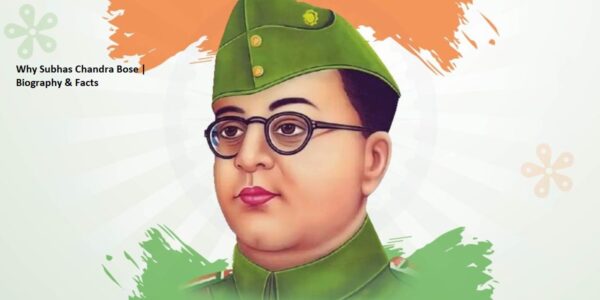Why Subhas Chandra Bose | Biography & Facts
Subhas Chandra Bose was an Indian nationalist leader and one of the most prominent figures in the Indian independence movement against British rule. Born on January 23, 1897, in Cuttack, Orissa, Bose belonged to a prominent Bengali family.
He became involved in the Indian National Congress during the 1920s and 1930s and rose to prominence through his strong advocacy for complete independence for India. Bose disagreed with Mahatma Gandhi’s nonviolent approach and instead believed in more militant methods to achieve independence.
During World War II, Bose saw an opportunity to advance India’s cause by collaborating with Axis powers against the British. He fled to Germany in 1941 and later to Japan, where he formed the Indian National Army (INA) with Indian prisoners of war and residents in Southeast Asia. The INA fought alongside the Japanese army against the British in Burma and Northeast India.
Bose’s leadership and charisma made him a hero to many Indians, but his alliance with Axis powers remains a controversial aspect of his legacy. His famous slogan “Give me blood, and I shall give you freedom!” reflects his unwavering commitment to India’s independence struggle.
However, Bose’s mysterious disappearance in 1945 remains a subject of debate and speculation. The circumstances of his death are not entirely clear, with some theories suggesting that he died in a plane crash in Taiwan, while others claim that he survived and lived under an assumed identity. Despite his controversial methods and uncertain fate, Subhas Chandra Bose remains a revered figure in Indian history, celebrated for his unwavering dedication to the cause of Indian independence.
Early life
Subhas Chandra Bose was born on January 23, 1897, in Cuttack, Orissa, which was then part of British India. He was the ninth child of Janakinath Bose, an affluent lawyer, and Prabhavati Devi. Subhas Bose belonged to a Bengali Kayastha family with a long history of involvement in public service and intellectual pursuits.
Bose received his early education in Cuttack before moving to Calcutta (now Kolkata) to complete his schooling. He excelled academically and was deeply influenced by the nationalist ideas prevalent in Bengal at the time. His family’s connections with prominent nationalist figures also played a role in shaping his political consciousness.
After completing his schooling, Bose traveled to England to pursue higher studies at Cambridge University. He was deeply impacted by the nationalist movements in Europe and was drawn to the ideas of socialism and anti-imperialism. During his time in England, Bose also became involved with the Indian Independence Movement, joining the Cambridge Majlis, an Indian student organization advocating for India’s freedom.
Upon returning to India, Bose briefly worked as a teacher at the University of Calcutta before deciding to pursue a career in civil service. However, his experiences with discrimination and injustice within the colonial bureaucracy further fueled his commitment to the cause of Indian independence.
Bose’s early life experiences, including his education in England and exposure to nationalist ideas, laid the foundation for his future role as one of the most influential leaders in the Indian independence movement. His determination, intellect, and passion for justice shaped his approach to challenging British colonial rule in India.
political activity
Subhas Chandra Bose’s political activity was characterized by his unwavering commitment to achieving complete independence for India from British rule. He emerged as one of the most dynamic and radical leaders of the Indian National Congress during the pre-independence era.
Bose’s political career began in the early 1920s when he joined the Indian National Congress, which was at the forefront of the independence movement. He quickly rose through the ranks due to his charismatic leadership and fiery oratory skills. However, he found himself at odds with the dominant faction within the Congress, led by Mahatma Gandhi and Jawaharlal Nehru, who advocated for a nonviolent approach to achieving independence.
Bose believed that more aggressive and militant methods were necessary to confront British colonialism. In 1939, he was elected President of the Indian National Congress but resigned from the position due to ideological differences with Gandhi and Nehru. He then formed the Forward Bloc within the Congress, advocating for complete independence and a socialist-oriented economic system.
During World War II, Bose saw an opportunity to exploit Britain’s weakness and launched efforts to enlist support from Axis powers such as Nazi Germany and Imperial Japan. In 1941, he escaped house arrest in India and traveled to Germany, where he met with Adolf Hitler and sought military assistance for India’s liberation.
Bose’s collaboration with Axis powers remains controversial, with critics accusing him of compromising India’s moral stance by aligning with fascist regimes. However, his primary objective was always the liberation of India from British rule.
In 1943, Bose traveled to Japanese-occupied Southeast Asia and established the Provisional Government of Free India. He also formed the Indian National Army (INA) composed of Indian prisoners of war and civilians to fight alongside the Japanese against the British in Southeast Asia. The INA’s battles in places like Burma (now Myanmar) and Northeast India marked a significant chapter in India’s struggle for independence.
Bose’s leadership and vision inspired thousands of Indians to join the INA, viewing it as a viable alternative to the nonviolent struggle led by Gandhi. Despite facing logistical challenges and eventual defeat, Bose’s efforts contributed to weakening the British resolve to continue colonial rule in India.
Overall, Subhas Chandra Bose’s political activity was characterized by his radicalism, determination, and willingness to adopt unconventional methods to achieve the goal of Indian independence. He remains a controversial yet revered figure in Indian history, celebrated for his unyielding commitment to the cause of freedom.
Activity in exile
Subhas Chandra Bose’s activity in exile was a significant aspect of his political career, particularly during World War II. After resigning from the presidency of the Indian National Congress due to ideological differences with Gandhi and Nehru, Bose found himself under house arrest by the British authorities in India.
Seeking support for India’s independence struggle, Bose made several attempts to travel to countries that were adversaries of the British Empire. In 1941, he successfully escaped from house arrest in India and made a daring journey through Afghanistan and the Soviet Union to reach Nazi Germany.
In Germany, Bose sought to garner support for India’s liberation from both Nazi Germany and Fascist Italy. He met with high-ranking Nazi officials, including Adolf Hitler, and sought military assistance and diplomatic recognition for his cause. While Bose found some support among the Axis powers, particularly Japan, his collaboration with fascist regimes remains a controversial aspect of his legacy.
In 1943, Bose left Germany and traveled to Japanese-occupied Southeast Asia, where he established the Provisional Government of Free India in Singapore. He also formed the Indian National Army (INA) with Indian prisoners of war and civilians captured by the Japanese.
As the head of the INA, Bose sought to use military force to liberate India from British colonial rule. The INA, along with Japanese forces, engaged in battles against the British Indian Army in places like Burma (now Myanmar) and Northeast India.
Bose’s activity in exile was marked by his determination to harness international support and resources to further the cause of Indian independence. Despite the controversial nature of his alliances with Axis powers, Bose’s leadership inspired thousands of Indians to join the struggle for freedom.
However, Bose’s efforts ultimately met with limited success, as the Axis powers faced defeat in World War II. Bose’s mysterious death in 1945, which is still the subject of debate and speculation, marked the end of his exile and his active involvement in India’s independence movement. Nevertheless, his legacy continues to inspire generations of Indians who admire his courage, determination, and dedication to the cause of freedom.
Education
Subhas Chandra Bose received his early education in Cuttack, Orissa, where he was born. He attended the Protestant European School (currently known as Stewart School) in Cuttack. Later, he moved to Calcutta (now Kolkata) to pursue his higher education.
Bose completed his graduation in Philosophy from Presidency College, Calcutta (now Presidency University), where he was known for his academic excellence and exceptional leadership qualities. After completing his graduation, he traveled to England to pursue further studies.
In England, Bose enrolled at Fitzwilliam College, Cambridge University, to study for the Indian Civil Service (ICS) examination. However, his experiences in England, including exposure to nationalist ideas and discrimination faced by Indians, deeply influenced his political beliefs and aspirations.
While at Cambridge, Bose became involved in various nationalist activities and joined the Cambridge Majlis, an Indian student organization advocating for India’s independence. Despite initially preparing for the ICS examination, Bose ultimately decided to return to India to actively participate in the struggle for independence.
Bose’s education, both in India and England, played a significant role in shaping his political ideology and leadership style. His academic pursuits and exposure to diverse ideas contributed to his intellectual development, while his experiences of discrimination and injustice fueled his commitment to fighting against colonial rule in India.
Subhash Chandra Bose’s Wife
Subhas Chandra Bose married Emilie Schenkl, an Austrian woman, in 1937. Emilie Schenkl was the daughter of a Vienna-based Austrian father and a Polish mother. She met Subhas Chandra Bose in Europe during the mid-1930s, when Bose was pursuing his efforts to gather international support for India’s independence struggle.
Their relationship blossomed, and despite the challenges posed by Bose’s political activities and his subsequent periods of exile, Emilie remained devoted to him. They were married in a simple ceremony in Bad Gastein, Austria, on December 26, 1937. Their marriage took place while Bose was on a visit to Europe to gather support for India’s freedom struggle.
Emilie Schenkl accompanied Bose during his travels and supported him in his political endeavors. Despite being separated for long periods due to Bose’s involvement in the independence movement and his subsequent exile, their relationship endured.
After Bose died in 1945, Emilie continued to uphold his legacy and played a significant role in preserving his memory. She raised their daughter, Anita Bose Pfaff, who later became a noted economist and academic. Emilie Schenkl passed away in 1996, leaving behind a legacy intertwined with the history of India’s struggle for independence and the life of Subhas Chandra Bose.
Disappearance
The disappearance of Subhas Chandra Bose remains one of the most enduring mysteries in modern Indian history. Bose’s whereabouts and fate following World War II have been the subject of much speculation and debate.
Here’s a brief overview of the events surrounding his disappearance:
In April 1945, Subhas Chandra Bose reportedly died in a plane crash in Taiwan (then Formosa). He was traveling in a Japanese plane from Singapore to Tokyo when the aircraft crashed, resulting in fatal injuries for Bose. This version of events is supported by the official inquiry conducted by the British authorities after the war.
However, there are several theories and controversies surrounding Bose’s death:
Survival Theory: Despite the official account of his death in the plane crash, many conspiracy theories suggest that Bose may have survived and lived under an assumed identity. Some claim that he may have fled to the Soviet Union or other countries to avoid capture by the Allied forces or potential reprisals from the British.
Russian Angle: There are claims that Bose may have sought refuge in the Soviet Union, possibly due to his disillusionment with the Axis powers or in pursuit of new alliances to further India’s cause. However, there has been no concrete evidence to support this theory, and the Soviet Union consistently denied any involvement or knowledge of Bose’s whereabouts.
Cover-Up: Some historians and researchers allege that there was a deliberate cover-up by the British and Indian governments regarding Bose’s death. They argue that the circumstances surrounding the plane crash were suspicious, and key details were withheld or manipulated to suppress the truth about Bose’s fate.
Despite numerous investigations and inquiries over the years, the mystery of Subhas Chandra Bose’s disappearance has not been conclusively resolved. The Indian government has declassified several files related to Bose’s life and death, but many questions remain unanswered, fueling ongoing speculation and interest in the fate of one of India’s most enigmatic and revered leaders.
Conclusion
The conclusion regarding Subhash Chandra Bose, one of India’s most revered freedom fighters, is multifaceted and subject to interpretation based on historical perspectives and ongoing debates. Here are some key points that summarize various viewpoints on Bose’s life and legacy:
Independence Movement Leadership: Subhash Chandra Bose was a prominent leader in India’s struggle for independence from British colonial rule. His dynamic leadership and commitment to achieving freedom through any means necessary, including armed resistance, inspired many.
Formation of the INA: Bose’s most significant contribution was the establishment of the Indian National Army (INA) during World War II. He allied with Axis powers, particularly Japan, to organize Indian prisoners of war and civilians in Southeast Asia to fight against British rule in India.
Controversial Tactics: Bose’s alliance with Axis powers, particularly seeking support from Nazi Germany and Imperial Japan, remains a subject of controversy. While some view his actions as pragmatic measures to achieve independence, others criticize his association with regimes known for their atrocities.
Mystery Surrounding His Death: Bose’s death in a plane crash in August 1945 remains shrouded in mystery and conspiracy theories. While the official account suggests that he died in the crash in Taiwan, there are persistent claims and theories suggesting that he may have survived and lived under an assumed identity.
Legacy and Ideology: Bose’s legacy continues to inspire generations of Indians, particularly those advocating for a strong, united, and independent India. His ideologies, including his emphasis on national unity, self-reliance, and secularism, have left a lasting impact on Indian politics and society.
Varying Interpretations: Despite his significant role in the independence movement, opinions about Bose remain divided. Some view him as a hero and a patriot who made immense sacrifices for the nation’s freedom, while others criticize certain aspects of his leadership and alliances.
In conclusion, Subhash Chandra Bose’s legacy is complex and multifaceted, with differing interpretations depending on one’s perspective. While he is widely celebrated for his contributions to India’s struggle for independence and his role in organizing the INA, his methods and associations continue to be debated. Nonetheless, his commitment to the cause of Indian freedom and his vision for a strong, united nation continue to resonate with many people in India and beyond.
FAQs
Certainly! Here are some frequently asked questions (FAQs) about Subhash Chandra Bose:
Who was Subhash Chandra Bose?
Subhash Chandra Bose was a prominent Indian nationalist leader who played a crucial role in India’s struggle for independence from British rule during the first half of the 20th century.
What was Subhash Chandra Bose’s role in the Indian independence movement?
Bose emerged as a prominent leader within the Indian National Congress and later formed the Forward Bloc. He is best known for his leadership of the Indian National Army (INA), which he formed to fight against British rule in India during World War II.
What is the Indian National Army (INA)?
The Indian National Army (INA) was a military force formed by Subhash Chandra Bose to overthrow British rule in India. Comprising Indian prisoners of war captured by Japan and civilians in Southeast Asia, the INA fought alongside the Japanese during World War II.
What were Subhash Chandra Bose’s ideologies?
Bose believed in aggressive tactics to achieve India’s independence, including armed struggle if necessary. He was known for his emphasis on national unity, self-reliance, and secularism. Bose’s ideologies were influenced by his commitment to achieving complete independence for India.
What is the controversy surrounding Subhash Chandra Bose’s death?
Bose’s death in a plane crash in August 1945 remains controversial. While the official version states that he died in the crash in Taiwan, there are persistent claims and conspiracy theories suggesting that he may have survived and lived under an assumed identity.
What is Netaji Subhash Chandra Bose’s legacy?
Subhash Chandra Bose’s legacy is celebrated in India and beyond for his contributions to the freedom struggle. He is revered as a national hero who inspired millions with his leadership and vision for a strong, independent India.
How is Subhash Chandra Bose remembered today?
Bose is remembered through various memorials, institutions, and events across India. His contributions to the independence movement are commemorated annually on his birth anniversary, January 23, which is observed as “Netaji Jayanti.”
Did Subhash Chandra Bose have any significant impact on Indian politics?
Yes, Bose’s legacy continues to influence Indian politics, with his ideas of nationalism, self-reliance, and secularism resonating with many political leaders and parties. He is often cited as an inspiration for those advocating for a strong and united India.


 For all latest news, follow The carefulu Google News channel.
For all latest news, follow The carefulu Google News channel.





